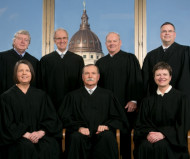7/31/2018
Kansas Supreme Court Rejects Owner Is Driver PresumptionA unanimous Kansas Supreme Court found it unreasonable to presume the owner of an automobile is the person behind the wheel.

Red light camera and speed camera programs around the country rely upon the legal presumption that the registered owner of the vehicle is also the one behind the wheel. In the Fourth Amendment context, the Kansas Supreme Court on Friday declared that this notion is so flimsy it does not rise to the level of reasonable suspicion.
The unanimous court reversed a Court of Appeals decision finding no problem with Douglas County Sheriff's Deputy Mark Mehrer's decision to pull over a 1995 Chevrolet 1500 pickup truck on April 28, 2016. The deputy did not observe any traffic violations, but he discovered that the license plate was registered to Charles Glover Jr whose license was revoked. He simply assumed Glover would be behind the wheel. He did not attempt any visual confirmation before ordering the car to pull over.
The high court explained that a police officer must point to specific facts and have an objective basis for pulling someone over -- something more than a hunch. In the 1979 case Delaware v. Prouse, the US Supreme Court held that pulling over a motorist just to check his driver's license is unconstitutional. The Kansas court pointed out the case at hand was slightly different.
"Deputy Mehrer had some suspicion of a specific crime -- driving while revoked," Justice Marla J. Luckert wrote. "But Deputy Mehrer, who had not observed a traffic violation, needed reasonable suspicion Glover was driving, not just some suspicion."
Prosecutors insisted that it was reasonable for the deputy to presume the owner was the one driving in the absence of evidence to the contrary. The high court said this reasoning was backwards.
"First, the owner-is-the-driver presumption implicitly requires applying and stacking unstated assumptions that are unreasonable without further factual basis," Justice Luckert wrote. "Second, the presumption rests, in part, on what the officer does not know."
The high court found it unreasonable to draw the conclusion that owner is always going to be the driver.
"Common experience in Kansas communities suggests families may have several drivers sharing vehicles legally registered in the names of only one or two of the family members," Justice Luckert wrote. "Unless the officer is familiar with the registered owner and his or her driving habits or has another factual foundation, the officer can only assume, not infer, the owner is the driver. And an assumption does not satisfy the Terry standard."
The high court also explained that it might be easier for police to avoid doing work to confirm a driver's identity, but that is exactly what the Fourth Amendment demands.
"The owner-is-the-driver presumption is also invalid because it relieves the state of its burden by eliminating the officer's need to develop specific and articulable facts to satisfy the state's burden on the determinative issue of whether the registered owner is driving the vehicle, not whether the vehicle is being driven," Justice Luckert wrote.
A copy of the ruling is available in a 200k PDF file at the source link below.


